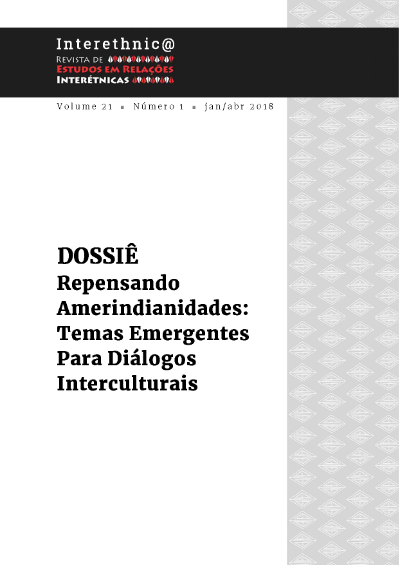Orality and ethnic identity: the Quilombola community of Ong, municipality of Carnaubeira da Penha (PE)
DOI:
https://doi.org/10.26512/interethnica.v21i1.10492Keywords:
Quilombolas, Roberts, Anthropological Report.Abstract
This text aims to show the quilombola community of Ong, Carnaubeira da Penha, Pernambuco state that, even after its certification by the Palmares Cultural Foundation on 08 March 2005, still face difficulty in obtaining social recognition and academic. The textual basis of this article is the anthropological Report of identification of this community developed in the framework of the Integration Project of the São Francisco River. Here we analyze the anthropological report of Ong aiming to contribute to the academic knowledge of social reality. The methodological approach was integrated by bibliographic research-documentary and field research; which consisted of various meetings, initials, with the community, in the interviews (recorded in digital file) and many fotos. The theoretical debate about memory, orality, invisibility, quilombo and ethnicity directs this analysis. If it concludes that the adoption of the quilombola category among the inhabitants of the Ong is recent; however, fragile. The statement to be Afro-Brazilian or not based on black ancestry, and at the present moment - in which the territory is neighbor of indigenous communities (which has a more significant political advantages) this is reconsidered.
Downloads
References
ALMEIDA, Alfredo Wagner Berno. 1996. Quilombos: sematologia face a novas identidades. In: CRUZ, Magno José et al (org). 1996. Frechal, terra de preto: quilombo reconhecido como reserva extrativista. São Luiz: SMDDH/CCN-PVN.
ARARIPE, André; NASCIMENTO, Erika. Sertão quilombola. A formação dos quilombos no sertão de Pernambuco. Olinda: Centro de cultura Luiz Freire. 2008. 156 p.
ARRUTI, José Maurício P. Andim. Etnografia e história no mocambo: notas sobre uma “situação de perícia”. In, Leite (Org.) 2005.
ATAÃDES, Jézus Marco, MACHADO, Laís Aparecida e SOUZA, Marcos André Torres de. Cuidando do patrimônio cultural. Goiânia: UCG, 1997.
BANDEIRA, Maria de Lourdes. Território negro em espaço branco: estudo antropológico de Vila Bela. São Paulo: Brasiliense, 1988.
BARBOSA, Luís de Lima. Em www.ceplac.gov.br/radar/artigos/artigo.21htm. Acesso em 19/02/2009.
BEZERRA, Tercina Maria Lustosa Barros. O quilombo “Negros do Gilu” em Itacuruba: emergência etnoquilombola e territorialidade. Recife, UFPE, 2006. Dissertação de Mestrado.
BROWN e BARNETT. Dicionário de Sociologia. Versão on-line. www.prof2000.pt/users/dicsoc/soc_html-7k
CARDOSO, Luís Fernando Cardoso e. A construção local: direito e território quilombola na comunidade de bairro Alto, na ilha de Marajó ”“ Pará. Tese de Doutorado. Florianópolis: UFSC, 2008.
Centro Cultural Luiz Freire. Sertão quilombola: a formação dos quilombos no sertão pernambucano. Olinda, 2008.
HARRISON, Lawrence E. w HUNTINGTON, Samuel P. A cultura importa: os valores que definem o progresso humano. Rio de Janeiro: Record, 2004.
GUSMÃO, Neusa Maria Mendes de. Terra de pretos, terra de mulheres. Terra, mulher e raça num bairro rural negro. Brasília: Fundação Cultural Palmares, 1995.
LEITE, Ilka Boaventura. Negros no sul do Brasil: invisibilidade e territorialidade. Florianópolis: Letras Contemporâneas, 1996.
OLIVEIRA JUNIOR, Geraldo Barboza de. Cultura e meio ambiente. Publicação eletrônica. www.kriterion.zlg.br/pg83.aspx. Acessado em 06/03/2009.
MENDONÇA, Caroline Farias Leal. Insurgência política e desobediência epistêmica: movimento descolonial de indígenas e quilombolas na Serra do Arapuá. (Tese Doutorado). Recife: Universidade Federal de Pernambuco,
CFCG, Programa de Pód-Graduação em Antropologia. 2013.
MONTENEGRO, Antônio Torres, FERNANDES, Tânia Maria, organizadores, História oral um espaço plural, Recife: Universitária; UFPE 2001.
RAPCHAN, Eliane Seibrika. O uso da narrativa nas Ciências Sociais: algumas notas e reflexões acerca de suas possibilidades. In: MONTENEGRO, Antônio Torres e FERNANDES, Tania Maria (Org.). História Oral: um espaço
plural. Recife: Universitária; UFPE, 2001. Secretaria Municipal de Educação de Carnaubeira da Penha. Conhecendo melhor o nosso município. Apostilha/Mimeo. Carnaubeira da Penha, SMEC, 2002.
Downloads
Published
How to Cite
Issue
Section
License
COPYRIGHT AND EXCLUSIVITY
At the time of submission, authors undertake not to send this manuscript to another journal during the reviewing process. Conversely, the Journal does not accept articles that are still under review in other journals. Neither will it accept two simultaneous reviews of the same author, understanding that this constitutes simultaneity.
Submission automatically implies full assignment of the copyright, including translation, if the article is approved for publication. Authors may reproduce their articles, provided that the original source (Interethnic Journal) is cited
GOOD SCIENTIFIC PRACTICES
TAll submitted articles will be submitted to plagiarism and "self-plagiarism" or republishing (publication as unpublished material of texts already published). Eventual cases of bad practice will be examined and decided by the editorial committee according to the guidelines of the National Council for Scientific and Technological Development (CNPQ).
The integrity of the content of the articles is the sole responsibility of the authors.



